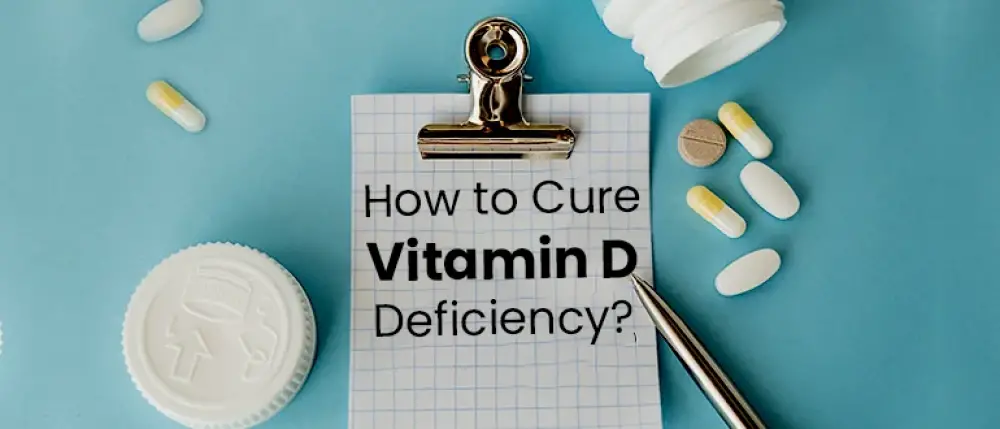Subscribe to get weekly insights
Always stay up to date with our newest articles sent direct to your inbox
Published on 6 Aug, 2024
Updated on 11 Mar, 2025
30218 Views
6 min Read

Written by Mudit Handa
8Likes
Vitamin D is crucial for the proper functioning of the human body. Severe vitamin D deficiency may negatively affect your body, especially your bones and muscles. However, the good news is that you may cure vitamin D deficiency naturally.
This article will talk about what is Vitamin D deficiency, its causes, consequences and various ways to prevent it. Keep reading!
Vitamin D is a nutrient that our bodies synthesise from sunlight and natural fatty foods with animal origins such as egg yolks, beef liver, fatty fish, fish liver oil and certain dairy products and plant-based food like mushrooms. Our liver and kidneys play a vital role in converting the synthesised Vitamin D into a form which may be used by our body.
Vitamin D is vital in maintaining the levels of calcium in our bodies, which is required for the growth of our bones. It also plays vital roles in the growth of our cells, maintaining the balance of our hormones and supporting the functioning of our body’s immunity. When our body doesn’t receive the sufficient amount of vitamin D, it starts showing the vitamin D deficiency signs.
There are a number of vitamin D deficiency signs, the main ones being as follows:
These symptoms reflect the effect that low vitamin D levels have on the functioning of your brain, your immunity and the production of hormones.
The amount of daily intake of vitamin D necessary for the smooth functioning of your body depends on your age and stage in life. The requirement may be expressed in units of micrograms (mcg) or International Units (IU). The recommended daily intake of vitamin D as per your age is as below:
Vitamin D levels in your blood are measured by a blood test which checks for the level of 25-hydroxyvitamin D in your blood. This level is measured in units of nanomoles per litre of your blood (nmol/L) or as units of nanograms per millilitre of your blood (ng/mL). 1 nmol/L is equivalent to 0.4 ng/mL.
The levels of vitamin D that are considered to be adequate and deficient are as below:
The following are the causes of vitamin D deficiency:
Certain medicines and medications too may cause deficiency of vitamin D in your body. Such medicines and medication include the following:
There are different ways to treat your vitamin D deficiency by fulfilling its required dose. They may be broadly categorised as:
One of these ways or combination of these to treat D vitamin deficiency will be determined by consulting with your doctor only.
If you wonder what food is highest in vitamin D consider including the following foods in your diet that are known to be rich in vitamin D:
Vitamin D is also known as the ‘Sunlight Protein’ as your body produces vitamin D from the cholesterol present in your body when you are out in the sunlight. As a result, your doctor may recommend that you stay outdoors, exposed to the sunlight for longer hours to allow your body to produce vitamin D naturally. However, do take precautions by applying sunscreen and also understanding and adhering to the time you may safely be out in the sunlight.
Vitamin D deficiency may be cured within a period as per your age, the nature of the severity of the deficiency you are suffering from and your overall health condition. On average, a doctor prescribes supplements such as cholecalciferol for a period of up to 10 weeks for adults and a period of up to 12 weeks for children.
The natural methods may take slightly longer, but these are to be adhered to for successfully maintaining the optimum level of vitamin D in your body.
Vitamin D deficiency does not have symptoms which are alarming in nature, but overall you will feel uneasy. It is advised you seek medical attention to be able to identify whether you are suffering from this deficiency. Your doctor may require you to undertake some blood tests to identify the underlying causes of your symptoms. Vitamin D deficiency is treated through prescription supplements and by modification of your diet and lifestyle.
Furthermore, keep your health insurance cover active and renewed on time to avoid claim rejection in times of a medical emergency. With an active and comprehensive plan like Care Health Insurance you can cover the diagnostic tests along with in-patient treatment expenses.
>> Also Read: How to deal with Vitamin C Deficiency?
Disclaimers: The above information is for reference purposes only. Kindly consult your general physician for verified medical advice. The health insurance benefits are subject to policy terms and conditions. Refer to your policy documents for more information.
शुगर कंट्रोल कैसे करे? जानें, डायबिटीज में क्या खाना चाहिए Care Health Insurance in Health & Wellness
Thyroid : मामूली नहीं हैं महिलाओं में थायराइड होना, जानें इसके लक्षण और घरेलू उपचार Care Health Insurance in Diseases
हाई ब्लड प्रेशर को तुरंत कंट्रोल कैसे करें? देखें इसके उपाय Care Health Insurance in Diseases
प्लेटलेट्स की कमी के लक्षण, कारण और इलाज क्या है Care Health Insurance in Diseases
Respiratory System: Anatomy of the Body’s Breathing Organ Care Health Insurance in Health & Wellness
Choking Skies - The Battle Against Air Pollution Care Health Insurance in Health & Wellness
Top Back Exercises to Strengthen Muscles and Prevent Injury Care Health Insurance in Fitness
Health Insurance Costs and Role of Fitness Programs Care Health Insurance in Fitness